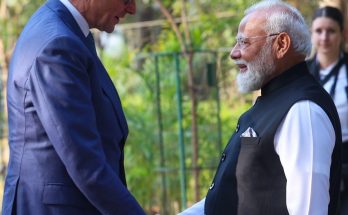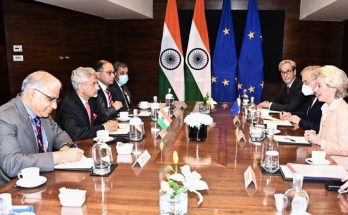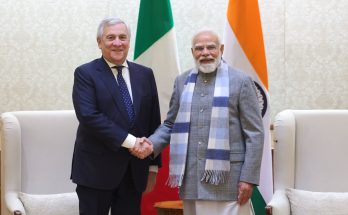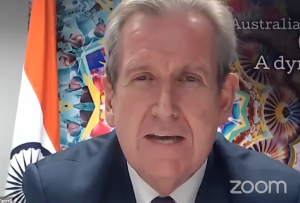
By Shweta Aggarwal & Rushali Saha
Nearly a month after the first virtual India-Australia summit, Australian High Commissioner to India Barry O’Farrell said Canberra will work closely with New Delhi in shaping a new global order through the proposed G-11 grouping, suggested by US President Donald Trump, and batted for enhanced cooperation among like-minded democracies in the Quad and the expanded G7 grouping.
The Australian envoy declared strong support for India’s candidacy for a permanent seat in the UN Security Council and India-led global institutions such as the International Solar Alliance and the Coalition for Disaster Resilient Infrastructure.
“Australia wishes to work more closely with India in shaping the multilateral system, including through any involvement in what might be an expanded G11,” said the Australian envoy at an international; webinar themed “From G7 to G11: Unscrambling post-COVID Geopolitical Alphabet”, organized by India Writes Network and India and the World magazine on July 2.
“Prime Minister Morrison took the opportunity to acknowledge and congratulate Prime Minister Modi for his leadership, first in his own region, through convening a SAARC leaders’ meeting and more globally by his calling for the strengthening of the World Health Organization,” he said.
Three Areas
Mapping the future of India-Australia partnership, the envoy highlighted three areas where Australia could work closely with India. “The first is making multilateral institutions more fit for purpose. Australia has welcomed India’s strong leadership through the COVID crisis in advocating for the role of the G20 as an early and strong proponent of the WHO reform. We look forward to working closely with Mr Harshvardhan as the chair of the organization’s executive board,” he said.
“The second is ensuring these institutions evolve to be more representative. Voices like that of India need more prominence. And that’s why Australia is a strong supporter of India becoming a permanent member of the United Nations Security Council, and joining the Nuclear Suppliers Group.”
“And the third is in backing India’s own new international institutions. Australia has been an early supporter, and is an ongoing member of the Coalition for Disaster Resilient Infrastructure and the International Solar Alliance,” he said.

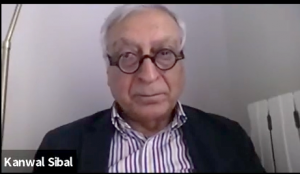
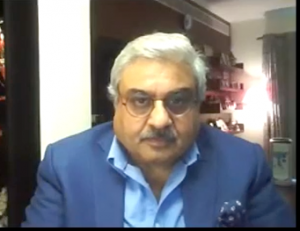

The webinar, moderated by Manish Chand, Founder-CEO and Editor-in-Chief, India Writes Network and India and the World, featured some of the iconic figures in the world of foreign policy and strategic thinking. Besides the Australian envoy, the speakers included Amb. Kanwal Sibal, a former Foreign Secretary of India and India’s former Ambassador to France and Russia; Amb. Richard Verma Vice-Chair & Partner, The Asia Group, a former US Ambassador to India; Amb. Anil Wadhwa, former secretary (East) in Ministry of External Affairs and India’s former ambassador to Italy, Thailand and Oman; and Gautam Bambawale, India’s former ambassador to China, Pakistan & Bhutan.
In his remarks, Mr Verma, a former US Ambassador to India, underlined that it was high time that India was “given a seat in the high table” in a world where a “broader G7 is a non-starter.” He argued that India has come a long way from overcoming domestic compulsions to play a more assertive role in global forums making it a suitable candidate for the much-coveted permanent seat at the United Nations Security Council.

“The really important question is what all of you have been talking about for years, which is giving India a seat at the high table, giving India a seat in international institutions. And I was proud to be part of an administration, the first administration in the US history that welcomed India’s seat onto the permanent membership of the UN Security Council,” said Mr Verma.
New Exciting Phase: 4Ds
Placing the burgeoning India-Australia partnership against the larger geopolitical landscape in the region, Mr O’Farrell said: “It’s vital that like-minded democracies uphold the fundamental democratic values in the multilateral system and work together, including through the Quad and expanded G7 and other ad hoc multilateral groupings.” The envoy’s remarks came amid an ongoing border standoff between India and China.
Going forward, the envoy underscored that “this new and exciting phase of the Australia-India relationship is best described as being characterized by the four Ds: Democracy, Defense, Diaspora where one in fifty Australians are of Indian origin and Dosti, what we Australians call mateship but with a particular emphasis in this discussion on the democracy element,” he said.
On May 31, US President Donald Trump termed the G7 as a “very outdated group”, and proposed that the G7 be expanded to include India, Australia, South Korea and Russia in the grouping of the largest advanced economies. In a conversation with journalists aboard his special aircraft Air Force One, President Trump suggested that the G7 should be expanded and rechristened as “G10 or G11”, and proposed that the grouping holds an in-person meeting of leaders in September or November in the US this year.
Two days later, responding to President Trump’s G11 proposal in a telephonic conversation on June 2, India’s Prime Minister Narendra Modi commended him “for his creative and far-sighted approach, acknowledging the fact that such an expanded forum would be in keeping with the emerging realities of the post-COVID world.” Mr Modi underlined that India would be happy to work with the US and other countries to ensure the success of the proposed Summit.

Placing the debate about the expansion of G7 to G11 in the larger geopolitical context, Manish Chand said: “We are meeting at a time of unprecedented crisis and geopolitical churn triggered by a rampaging pandemic that has killed nearly one million and affected nearly 10 million people around the world.”
“This virus is brutally egalitarian and is no respecter of national borders; it has also blurred the hierarchy of rich and poor nations. It’s become a 3D world marked by Death, Despair and Devastation. In this 3D world, the only certainty is uncertainty. It’s time to replace these 3Ds with three Rs: Re-appraisal, Rebuilding & Resurgence. This is what this webinar is all about: Re-appraisal, Rebuilding, Resurgence. The theme of the seminar, “From G7 to G11: Unscrambling post-Covid geopolitical alphabet,” is therefore appropriate and could be seen as a metaphor for a changing world order,” he said.
(Sanjeeb Baruah contributed inputs for this article)
Author Profile
- India Writes Network (www.indiawrites.org) is an emerging think tank and a media-publishing company focused on international affairs & the India Story. Centre for Global India Insights is the research arm of India Writes Network. To subscribe to India and the World, write to editor@indiawrites.org. A venture of TGII Media Private Limited, a leading media, publishing and consultancy company, IWN has carved a niche for balanced and exhaustive reporting and analysis of international affairs. Eminent personalities, politicians, diplomats, authors, strategy gurus and news-makers have contributed to India Writes Network, as also “India and the World,” a magazine focused on global affairs.
Latest entries
 DiplomacyJanuary 5, 2026India walks diplomatic tightrope over US operation in Venezuela
DiplomacyJanuary 5, 2026India walks diplomatic tightrope over US operation in Venezuela India and the WorldNovember 26, 2025G20@20: Africa’s Moment – The Once and Future World Order
India and the WorldNovember 26, 2025G20@20: Africa’s Moment – The Once and Future World Order DiplomacyOctober 4, 2025UNGA Resolution 2758 Must Not Be Distorted, One-China Principle Brooks No Challenge
DiplomacyOctober 4, 2025UNGA Resolution 2758 Must Not Be Distorted, One-China Principle Brooks No Challenge India and the WorldJuly 26, 2025MPs, diplomats laud Operation Sindoor, call for national unity to combat Pakistan-sponsored terror
India and the WorldJuly 26, 2025MPs, diplomats laud Operation Sindoor, call for national unity to combat Pakistan-sponsored terror





